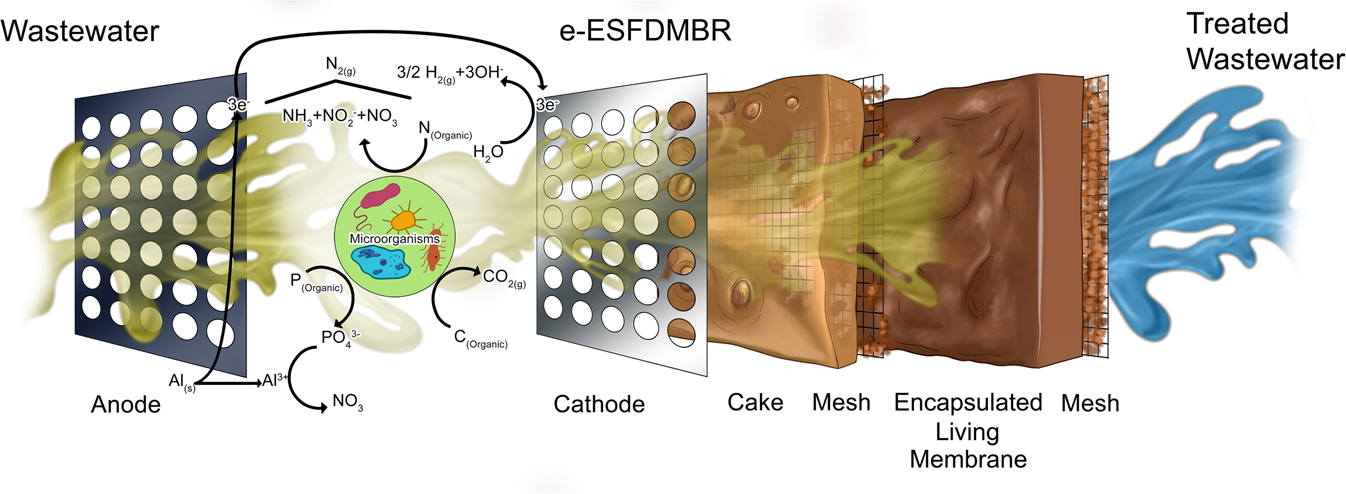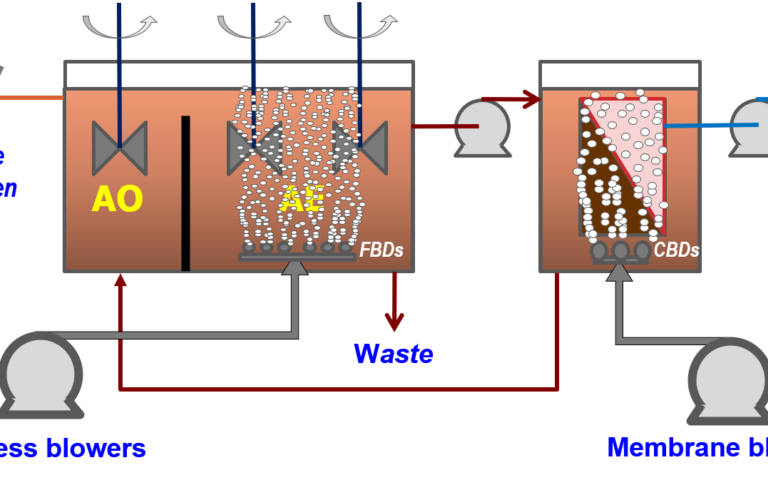Exploring the Benefits of Membrane Bioreactor in Municipal Wastewater Plants
Wiki Article
The Benefits of Membrane Bioreactors in Sustainable Wastewater Management
Membrane layer bioreactors (MBRs) represent a critical innovation in lasting wastewater management, successfully merging organic therapy with sophisticated membrane layer filtering technology. As the need for sustainable solutions escalates, checking out the multifaceted benefits of MBRs may disclose unexpected effects for the future of wastewater treatment systems.Introduction of Membrane Bioreactors
Membrane layer bioreactors (MBRs) represent a substantial improvement in wastewater therapy modern technology, integrating biological degradation with membrane layer purification to improve the efficiency of the treatment procedure. This innovative system incorporates the benefits of traditional turned on sludge processes with membrane layer technology, enabling improved solid-liquid separation. MBRs make use of semi-permeable membranes to separate cured water from biomass, causing top notch effluent that can be reused or securely released right into the setting.The operational style of MBRs typically includes a bioreactor where microbes break down natural issue, adhered to by a membrane system that filterings system the mixed liquor. This arrangement not just minimizes the footprint of the therapy center however additionally permits greater biomass focus and decreased hydraulic retention times. MBRs are qualified of dealing with a wider array of impurities, consisting of nutrients and pathogens, making them suitable for different applications, from metropolitan wastewater therapy to commercial effluent handling.
The combination of MBRs right into wastewater management systems is a sign of an expanding pattern towards sustainable and effective practices in ecological design. Their ability to create top quality effluent while reducing room requirements placements MBR innovation as a principal in contemporary wastewater treatment remedies.
Enhanced Effluent High Quality

The membrane layer purification procedure functions as a physical barrier, enabling the retention of microbes and particle issue, which contributes to a clearer and cleaner effluent (Membrane Bioreactor). Furthermore, MBRs run at higher biomass concentrations than standard triggered sludge systems, promoting extra reliable biodegradation of toxins. This results in a decrease in biochemical oxygen demand (FIGURE) and overall put on hold solids (TSS) degrees in the final effluent
In addition, MBRs demonstrate superb performance in dealing with tough wastewater structures, such as industrial effluents and wastewater with high nutrient lots. Because of this, the effluent generated is usually of higher high quality, enabling more flexible disposal options and decreased environmental influence. Inevitably, the improved effluent top quality achieved via MBR innovation underscores its essential role beforehand lasting wastewater management practices.
Water Reuse Opportunities
The top notch effluent created by membrane bioreactors (MBRs) web opens up considerable opportunities for water reuse in numerous applications. MBRs properly get rid of pollutants, consisting of virus, suspended solids, and organic matter, causing treated water that meets or surpasses governing criteria for reuse. This high quality permits the implementation of water reusing initiatives throughout varied industries.One famous application is in farming, where dealt with wastewater can be used for irrigation, advertising lasting farming techniques while conserving freshwater sources. Furthermore, MBR-treated effluent can be used for commercial procedures such as cooling, cleaning, navigate here and as a process water resource, dramatically minimizing the demand for safe and clean water in these operations.
In metropolitan settings, MBRs assist in using recovered water for landscape watering, commode flushing, and other non-potable uses, adding to the overall resilience of water system systems. In addition, the integration of MBR technology in decentralized systems aids in taking care of localized water needs, specifically in water-scarce areas.
Lowered Ecological Impact
Exactly how can the fostering of membrane bioreactors (MBRs) add to a minimized environmental influence in wastewater management? MBRs dramatically improve the therapy efficiency of wastewater while decreasing ecological disruptions. Membrane Bioreactor.Furthermore, MBRs operate at lower hydraulic retention times contrasted to conventional systems, leading to smaller sized treatment plant impacts. This small layout decreases land usage, therefore preserving natural environments and biodiversity. The procedure also produces much less sludge than typical methods, alleviating disposal obstacles and decreasing greenhouse gas emissions connected with sludge administration.
Furthermore, MBRs help with the recovery of important sources, such as water and nutrients, adding to a round economy. By allowing water reuse for watering or industrial processes, MBRs assist relieve freshwater deficiency, therefore promoting sustainable water utilize methods. Inevitably, the fostering of MBR technology represents a considerable stride towards lessening the ecological effect of wastewater monitoring systems.
Financial Advantages of MBRs

Furthermore, MBRs assist in the production of high-quality effluent, which can be reused for different applications, such as agricultural watering and industrial processes - Membrane Bioreactor. This reuse capability can substantially reduce water purchase expenses, offering a financial motivation for sectors dealing with rigorous water laws
The small design of MBR systems likewise leads to decreased land requirements, which is specifically beneficial in city locations where genuine estate is expensive. By minimizing room, districts and markets can reduce land procurement and maintenance expenses.
Furthermore, MBRs often call for less constant maintenance and have a longer lifespan than standard systems, additionally contributing to set you back savings. In recap, the economic advantages of MBRs-- varying from decreased functional expenses to land savings and effluent reuse-- make them a compelling selection for sustainable wastewater monitoring, using both long-term and instant financial benefits.
Verdict
In addition, MBRs add to reduced environmental influences via portable layouts and reduced sludge generation. Economic benefits better boost their stability, making MBRs an encouraging remedy for her explanation resolving the difficulties of wastewater treatment and promoting lasting source monitoring.
Membrane layer bioreactors (MBRs) stand for a crucial innovation in lasting wastewater administration, efficiently combining organic therapy with advanced membrane purification modern technology.Membrane layer bioreactors (MBRs) represent a significant innovation in wastewater treatment innovation, integrating organic deterioration with membrane purification to improve the effectiveness of the therapy process.Achieving boosted effluent high quality is one of the most significant benefits of utilizing membrane layer bioreactors (MBRs) in wastewater therapy.Additionally, MBRs show exceptional performance in dealing with challenging wastewater compositions, such as commercial effluents and wastewater with high nutrient lots.Incorporating membrane layer bioreactors (MBRs) right into wastewater administration not only minimizes environmental effect yet likewise presents considerable economic benefits.
Report this wiki page